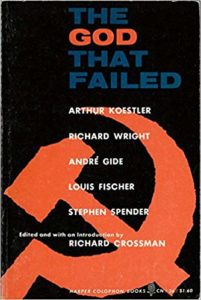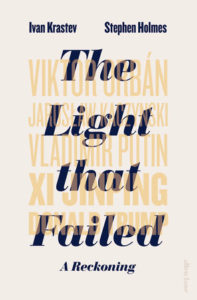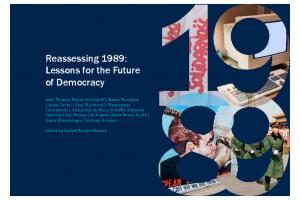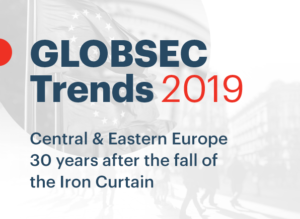“Always prepared!” For decades, it was a catchphrase of the Pioneers, an outdoorsy youth group that was a hallmark of communist indoctrination efforts targeting schoolchildren throughout the U.S.S.R. and its client states, note RFE/RL analysts Andy Heil and Wojtek Grojec.
But Eastern Europe’s communist leaders were the ones caught off guard 30 years ago, when mass strikes and pro-democracy demonstrations broke Moscow’s tight grip on the region. Peaceful revolutions punched holes in the Iron Curtain and toppled one-party rule in Poland, Hungary, East Germany, Bulgaria, and Czechoslovakia. Romania’s uprising, marred by violence, soon followed. Decades of Kremlin-sponsored censorship, isolation, and cultural and ideological brow-beating had failed: The kids were more than alright.
They offer a playful look, based on numerous personal and historical accounts, at clues to Czechoslovak disenchantment that pupils and students were toting around on the eve of that country’s Velvet Revolution.
 Silently, communist bureaucrats had been preparing themselves for the new capitalist dawn for several years, analyst Misha Glenny writes for the Financial Times:
Silently, communist bureaucrats had been preparing themselves for the new capitalist dawn for several years, analyst Misha Glenny writes for the Financial Times:
In Bulgaria, over 90 per cent of the joint-stock companies that had been formed since 1986 in the spirit of perestroika were actually owned by members of the communist secret police. Having warned the population for decades about the evils of capitalism, these senior party functionaries were now about to show them what this meant in practice.
Many of the dissidents, so important in forcing change, were swept aside. In Danton’s Death, his play about the French Revolution and written in 1835, Georg Büchner wrote how “the revolution is like Saturn. It devours its own children”. In eastern Europe, it was not long before the ruthlessly acquisitive new forces adopted this maxim by pushing aside the old dissidents.
From protest to politics?

Dimitrina Petrova
Perhaps the best-known participants in the popular uprisings of 1989 were dissident intellectuals who for decades had expressed a moral and social critique of communist governments. Most dissidents did not express, at least before the middle of 1989, any expectation that profound systemic transformation could occur in the near future, argues Dimitrina Petrova, a Bulgarian human rights activist and scholar who has written on the history of opposition to communism:
The prevailing vision among intellectuals was of a more or less gradual internal liberalization of one-party state socialism, with the goal of a more democratic but still socialist political system. Multi-party pluralist democracy combined with a capitalist market economy did not become a proclaimed objective until the second half of 1989. The programmatic documents of practically all dissident organizations in 1988 and 1989 articulated a liberal platform of democracy, human rights, and civil liberties. Freedom of speech, religious freedom, minority rights, and the right to access information were at the center of dissident demands. Equality was not.
 The striving of ex-communist countries to emulate the west after 1989 has been given an assortment of names – Americanisation, Europeanisation, democratisation, liberalisation, enlargement, integration, harmonisation, globalisation and so forth – but it has always signified modernisation by imitation and integration by assimilation, argue Ivan Krastev and Stephen Holmes, authors of The Light That Failed: A Reckoning.
The striving of ex-communist countries to emulate the west after 1989 has been given an assortment of names – Americanisation, Europeanisation, democratisation, liberalisation, enlargement, integration, harmonisation, globalisation and so forth – but it has always signified modernisation by imitation and integration by assimilation, argue Ivan Krastev and Stephen Holmes, authors of The Light That Failed: A Reckoning.
After the communist collapse, according to today’s central European populists, liberal democracy became a new, inescapable orthodoxy. Their constant lament is that imitating the values, attitudes, institutions and practices of the west became imperative and obligatory, they write for the Guardian:
Liberalism’s reputation in the region never recovered from 2008. The financial crisis greatly weakened the case, still being made by a handful of western-trained economists, for continuing to imitate American-style capitalism. Confidence that the political economy of the west was a model for the future of mankind had been linked to the belief that western elites knew what they were doing. Suddenly it was obvious that they did not. This is why 2008 had such a shattering ideological, not merely economic, effect.
“For the World War II generation in eastern Europe, communism was the ‘god that failed’”, John Feffer writes in A Journey into Eastern Europe’s Broken Dreams. “For the current generation in the region, liberalism is the god that failed.”
 The failure of the dissidents as effective democratic politicians contains important lessons, adds Glenny:
The failure of the dissidents as effective democratic politicians contains important lessons, adds Glenny:
Often they held wholly unrealistic expectations about how quickly their countries could prosper in the free-market system. The European Union insisted that the price of joining would involve painful reforms — worth it in the long run but always carrying the risk of a backlash. After half a century under the tyranny of the Soviet bloc, many eastern Europeans resented the prospect of joining another supranational structure — albeit one much more tolerant and considerably wealthier.
As time passed, many came to blame the new class landscape on the elites who presided over the “transition to democracy.” The process of accession to the European Union in the first years of the twenty-first century only postponed the destruction of elite legitimacy, argues Petrova, a former Reagan-Fascell fellow at the National Endowment for Democracy:
The formative experience of deep unfairness in the aftermath of 1989 created a dynamic that, a generation later, translated into a specific Central and Eastern European brand of illiberal populist rebellion.…It took a generation to reach the point where it was too soon to forget but too late to undo the injustice at the foundation of the new social hierarchies. By around 2010, the redistribution of power was complete. There was no more fishing in muddy waters: stronger laws and regulations had reined in but also ratified the wealth and property accumulated during the “transition.”
“It is therefore not correct to say that the root cause of the illiberal surge that started around 2006 and continues to this date is inequality itself; rather, it is the manifestly unfair way in which the new, post-1989 inequality was produced,” Petrova writes for Dissent. “Today, we face an irony that is the inverse of 1989: in order for equality to make its comeback, a popular mobilization for liberty must open the way.”
 Approaching the anniversary of the November 1989 Fall of the Berlin Wall, analysts Daniel Milo and Dominika Hajdu offered a nuanced assessment of where Central Europe stands today and the challenges it confronts. At a NED forum this week (above), they presented Globsec Trends 2019: Central & Eastern Europe 30 Years after the Fall of the Iron Curtain, a report based on the findings and assessment of more than 10,000 interviews conducted in seven countries including Austria, Bulgaria, the Czech Republic, Hungary, Poland, Romania, and Slovakia.
Approaching the anniversary of the November 1989 Fall of the Berlin Wall, analysts Daniel Milo and Dominika Hajdu offered a nuanced assessment of where Central Europe stands today and the challenges it confronts. At a NED forum this week (above), they presented Globsec Trends 2019: Central & Eastern Europe 30 Years after the Fall of the Iron Curtain, a report based on the findings and assessment of more than 10,000 interviews conducted in seven countries including Austria, Bulgaria, the Czech Republic, Hungary, Poland, Romania, and Slovakia.
Yet the idealists left their mark. While Orban and other populist leaders control Hungary and Poland and wield great influence in the Czech Republic and Slovakia, they face dogged resistance among large parts of the population, Glenny writes for the FT:
That resistance draws in part on the tremendous struggles for freedom that punctuated the 40 years of communism in eastern Europe: Hungary in 1956; Czechoslovakia in 1968; the strikes of Romania’s Jiu Valley miners in the late 1970s; Solidarity; Charter 77. It is thanks to this rich history that the revolutions of 1989 have not yet been comprehensively defeated.







